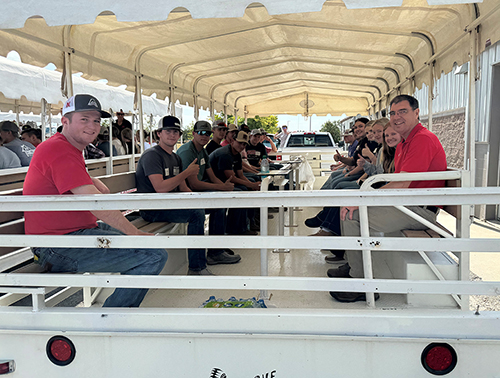NORFOLK, Neb. – These are challenging and exciting times for agriculture.
Northeast Community College students were able to learn about some of the latest advancements and obstacles to overcome during the annual Agronomy Field Day on Tuesday, Sept. 17.
Jill Heemstra, director of the Northeast Ag program, said students don’t always know about the various projects Northeast and the ag industry have taking place. Northeast’s collaborators -- who employ graduates, hire interns or value students as future customers – want them to know the latest happenings in agronomy.
During Agronomy Field Day, students were able to take trolleys to seven stations on Northeast property where they learned about such things as manure management, crop varieties, equipment advances and food production, among other things. Northeast has a working farm that was featured in several of the stations.
“They get to see the different stations, get to the fields, meet industry people and network with them,” Heemstra said.
Two of the stations focused on agriculture equipment, three stations focused on agronomy techniques, one focused on manure management and one focused on urban farming.
The field day was sponsored by the Dan Gillespie Soil Health Fund, AFAN (Alliance for the Future of Agriculture in Nebraska) and the Nebraska Soybean Board.
The Dan Gillespie Soil Health Fund paid for the trolleys that were used to transport students from station to station. Mr. Gillespie was a Natural Resources Conservation Services advocate who was passionate about soil health.
“He could talk about soil health with anyone. He passed away a few years ago and so his family fund different projects about soil health. They will also fund projects on people’s farms, trying to improve soil health,” Heemstra said.
AFAN helps ag producers try to diversify their operations with a livestock component and build the livestock industry in Nebraska. They also are a resource to young farmers, including Northeast students.
The Nebraska Soybean Board encourages and supports soybean farmers in the state, invests in research, interacts with local communities and promotes the versatility and sustainability of soybeans, among other things.
One of the challenges is that the USDA maintains that topsoil loss is double the rate that is sustainable. Excessive tillage, lack of soil cover, minimal diversity and overgrazing contribute to the problem.
Northeast students were divided into groups and then rotated among all the stations throughout the day, so they could see all the presentations.
“They are usually tired by the end of the day, but it gets to be a very good day. They get to be on the farm and be outside. It is fun to hear students when they say that they thought a certain station wouldn’t interest them, but then they will say they learned something that interested them,” Heemstra said.
For the most part, the stations were operated by industry collaborators, sharing information with students. Some of the same information will be shared later with farmers during farmer field days.
And because not all ag majors are agronomy students, such as animal science majors, topics like manure management were provided.
Connie Sixta, dean of Science, Technology, Agriculture & Math (STAM), was attending her first field day since assuming her new role as the dean of STAM.
“This is really an incredible opportunity for our students to get to visit with the industry representatives who are potential employers. Also, it helps them to learn what their businesses do and helps them to learn about what their products do, what to put on their fields to conserve soil health and to get the biggest yield they can,” Sixta said.
Northeast Agronomy Day
Northeast Community College ag students rode on trolleys to seven stations during Agronomy Field Day on Tuesday, Sept. 17. Among other things, they were able to converse with industry representatives to find out the best crop management and manure handling practices. (Northeast Community College)
###

